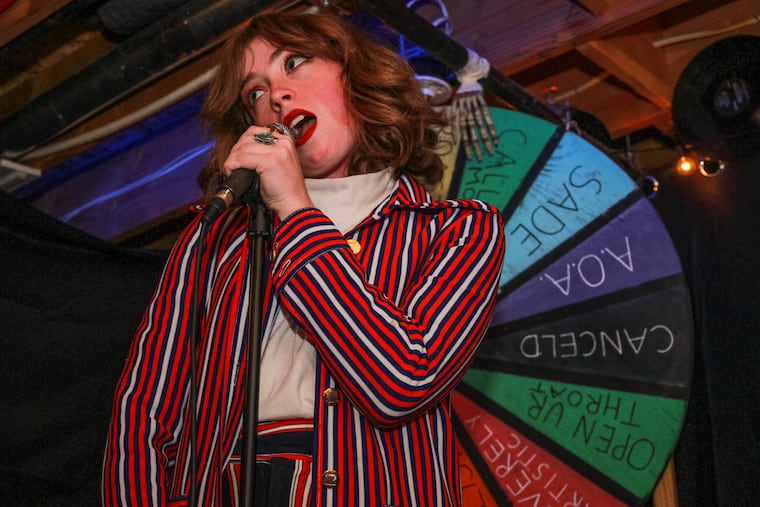From the basement of Temple students, a comedy club attracted national headliners — and up-and-comers
Jokes that get worked out in the basement of Cave can find their way into future specials and TV appearances, but in the meantime, the comedians that tell them can try whatever they want.

Lyle Drescher needed the folding chairs more than his mother did. She only used them when Passover rolled around, when she dragged them out from the basement.
Drescher’s experimental basement comedy club, meanwhile, had an open mic coming up, with a raucous crowd coming through the door — the door of his own house in North Philadelphia — and they were going to need somewhere to sit.
Some of those chairs got broken, some replaced. And the venture, run out of rowhouses Drescher shared with other Temple University undergrads, would eventually have a two-year run. Cave, what was thought to be the only house club dedicated exclusively to comedy in Philly — if not one of just a few in the country — brought in headliners with national followings to perform alongside the next comedians to know in Philadelphia.
On Thursday, though, it came to an end when the landlord shut things down after seeing some social media posts mentioning the address — it was a clear violation of the lease, she said.
“OK, we’re done doing shows in this house, but, like, we’re not done as producers," Drescher said. "As people who want to contribute to comedy and the Philly comedy community, we’re not even close to done.”
Just last month, comedian Mark Normand came to Cave, a performer who has appeared on Conan, The Late Show with Stephen Colbert, and The Tonight Show Starring Jimmy Fallon, and has been catered to in the best green rooms that late-night television has to offer. At Cave, Normand was provided with Chinese takeout and the movie Drive, projected onto the wall of Cave cofounder Dave Hogsett’s bedroom. Not that he’s complaining — on that Tuesday night, Normand performed three sold-out one-hour sets to crowds of 50. (One of the sets was attended by four representatives from Helium Comedy Club.)
“I feel more comfortable in a place like this, sadly, than in, like, a TV studio or a nice comedy club,” he said. “I got low self-esteem.”
A place like this, as Normand and others explained, is a club in which comics, established or not, could take chances. Jokes that got worked out in the basement of Cave could find their way into future specials and TV appearances. It wasn’t just low-stakes, Normand believed. It was no-stakes.
Drescher, 21, said his dream was for it to feel like a house party. And indeed, college students and denizens of the Philadelphia comedy community mixed in the living room and the backyard, when the weather permitted.
That wasn’t to say that Cave was amateurish. Unlike most house shows, where a comedian might simply tell jokes without a microphone in someone’s living room, Cave provided a stage, a real sound system, lighting, a dedicated merch-table volunteer, and many of the other amenities of an honest-to-God club. The difference was that those amenities didn’t come with the rigidity that established clubs might insist upon, in terms of material, presentation, or even the choice of an opener.
That said, comedians at Cave did perform under exposed pipes, and often joked about the audible flush of the upstairs toilet.
Chanel Ali, a North Philadelphia native and Temple grad, did a 45-minute set on Nov. 23, an invaluable amount of time for comedians hoping to work out the kinks in their material. That’s hard to come by at house shows, especially in New York, where Ali lives. Not that it’s hindered her too much; this year, she was named a “New Face” at the Just for Laughs festival in Montreal, a good indicator that a young comedian is on the upswing.
Cave began as a project of Drescher and Hogsett, two film and media arts majors, in the fall of 2017. Both were eager to see more comedy in the city that they would be calling home during their college careers, but neither was of age to get into the major venues. Rather than putter around at the edges of open mics that they could find, they decided they would start their own. Thus, Cave was born in their first house, at 15th and Fontain.
Though Cave was on its third house, at 17th and Arlington, the sensibility remained more or less unchanged, even as the variety of shows expanded — open mics and stand-up showcases mixed in with roast battles and burlesque shows. Shane Duffner, a friend of Drescher’s and Hogsett’s, created the punk rock playlist that’s shepherded audience members in and out of their chairs since the early Cave shows, and some of their most frequent collaborators began performing at Cave early on.
Alaina Clune is one of those collaborators. Clune, 23, cohosted the increasingly popular “Spin Da Freakin’ Wheel” show, where comedians perform their sets under various forms of duress, selected by the spin of a giant wheel. Fan favorites include “Chicken Kiss,” where comedians are struck on the butt with a rubber chicken during their punch lines, and “Knife,” where audience members chuck plastic knives at the comedian throughout their set.
Frank D. Neblett, 22, a standup comedian, was raised in North Philadelphia, and studies English at Temple. Cave’s neighborhood tends to be overrun with students who don’t engage with the people who live there, Neblett believes, which is what made Cave such an oddity. It was creating something "that people in the area can interact with,” Neblett said.
Cave wouldn’t have lasted forever. Drescher and Hogsett, 22, will both graduate at the end the fall semester. Maybe they will try and find a real space for Cave outside of a house.
“But overall,” Drescher said, “the truth is that we don’t know."